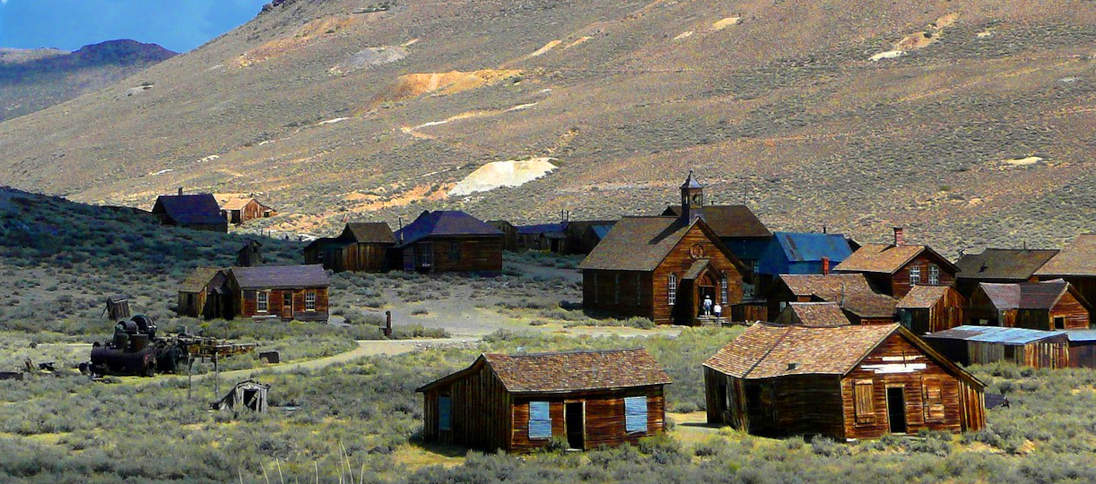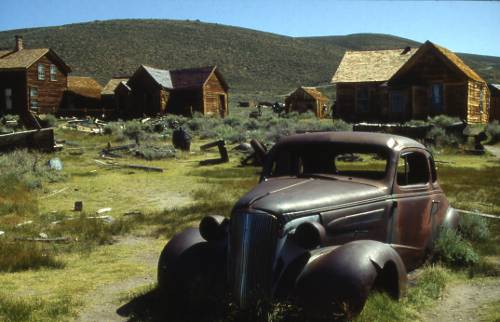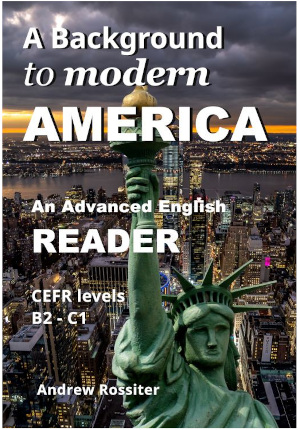
Bodie - where the West was once wildest
Story of a ghost town
Linguapress
Linguapress Advanced
English
American history
The
spirit of the "Wild West"
has been one of the defining
themes of American culture - literature, film and art - for the last
150 years. But the great age of the Wild West was actually rather
short. It began around 1850, with the opening up of the American west,
and by 1900 it was over. Towns appeared one year, and disappeared a few
years later. One of the finest examples is the California "ghost town"
of Bodie, which was once said to be the wildest town in the Wild West..
 Once
this was one of the wildest places in the Wild West.
Once
this was one of the wildest places in the Wild West."Bodie?", you say. "Where's that?"
Good question. But in 1880 in America, reactions would probably have been very different. Then, Bodie, with its population of over 10,000, was one of the most infamous places in the whole U.S.A., reputed as the worst, most violent and most lawless town in the Wild West. Many historians have quoted a letter from a young girl whose parents decided to go and live and work in Bodie; even this 12-year old knew of Bodie well by reputation, and in her diary she wrote: "Goodbye God! I'm going to Bodie". Bodie was "hell on earth".
In 1859, a gold prospector named William Body (pronounced like "roadie") discovered gold-bearing rock in a desolate part of the California desert. Claiming the stake in his name, he set up a base cabin there with two friends.
Since it was the start of winter, Body and one of his companions then went off to buy stores from the nearest shop..... about a hundred miles away. By the time they started back however, the temperature and the winter snows had begun to fall; and as the snow got deeper and deeper, the journey got harder and harder. Though the men were tough and knew how to survive under most circumstances, they had not reckoned with the terrible cold in the high California desert, situated at an altitude of over 2,500 metres. A few hundred metres from their cabin, Body collapsed. His friend struggled on to get help, but by the time it came, the snow had covered up his tracks completely. William Body's body was not found until the following spring.
Thus Body never extracted a single ounce of gold from his claim; but since it was his claim, the mining camp, then town, that grew up on the spot got named after him.
According to legend, the town's name changed from Body to Bodie because a sign-writer could not spell correctly. In actual fact, the change was deliberate, the townspeople did not want the name to be mis-pronounced. "Body" (rhyming with "shoddy") and implying a dead corpse, sounded rather macabre!
At first the town grew slowly, as there was more gold to be found in some other towns in the region, than near Bodie; besides, Bodie was such a desolate spot! It was not until some very rich veins of gold were discovered in 1876 that the Bodie gold rush really began.
Like most gold rush towns, Bodie grew very fast, then shrank again almost as fast, as the gold ran out. Maximum size was reached in 1880, when the town boasted 65 saloon bars and its own daily newspaper, in which its violence and lawlessness were reported in fine detail. On 5th September 1880, for example, the Bodie Standard reported three shootings, plus two hold-ups of stage coaches in one day!
By 1885, the town's population had dropped to a couple of thousand, many of the miners having gone off to seek better fortunes elsewhere; many of the town's wooden buildings had been burnt down. Fire, indeed, was a permanent risk in Bodie's dry climate, and the town was actually destroyed several times in its history, the last time in 1932.
English grammar
 From
Amazon,
Barnes & Noble, Waterstones and good bookshops
From
Amazon,
Barnes & Noble, Waterstones and good bookshopsThe man who did most for Bodie was Jim Cain, who opened the town's first bank in 1880. He was also one of the most successful of Bodie's miners, and as the town declined, he bought most of the buildings that no-one else wanted — including the principal mine.
After Bodie was abandoned by its last inhabitants during the Depression of the 1930's, Cain saved the town from total destruction. A watchman was installed at the mine, and his job was to make sure that no-one came and dismantled the remaining wooden buildings (as happened to so many other ghost towns).
As a result, the 150 buildings in Bodie that survived the fire have remained standing, as a real ghost town, until this day.
Today, the remains of the most lawless town in the West stand exposed to the hot summer sun and the cold winter frosts, as a memorial to one of the most turbulent ages in American history. During the short summer season, a few adventurous tourists drive along the unmade roads, to walk for themselves through the now-quiet streets of this once-active town; but most of the year, the streets are quite empty, and the only noise is the whistling of the cold dry wind as it blows round the corners of deserted buildings.
And in the old cemetery, just outside town, the bodies of William Body and others who perished in this desolate spot now lie in peace.
WORDS
diary: personal journal - bearing: carrying - stake: to reserve territory - stores: necessary things for the winter - reckon with: take account of - struggle: fight - tracks: marks in the snow - ounce: a few grams - claim: reserve - according to: in the words of - shoddy: of poor quality - spot: place - shrink: get smaller - boast: be proud of - stage coach: passenger coach - seek: look for - provide: ensure, give, supply - death warrant: death order - dismantle: take to pieces - perish: diePrinting: Optimized for the printing
Copyright © Linguapress. Do not copy this document to any other website
Copying permitted for personal study, or by teachers for use with their students
STUDENTS' WORKSHEET
Bodie - Where the West was Wildest
1. True or false... Say whether the following statements are right or wrong- Once its population reached about 10,000, Bodie stopped growing.
- The Bodie gold rush began
with William
Body's claim.
- By 1885, not much gold could be found.
- On September 5th 1880, the stage coach was held up twice, and three people were killed.
- Jim Cain died before he
had time to
celebrate his fiftieth birthday.
- The watchman's job, created before the Great Depression, was to make sure that no-one stole the remaining gold from the mines.
- oday Bodie has about 150 buildings still standing.
- William Body died a few hundred yards from his cabin.
- Within the space of 12 years, Bodie grew to being a big town, then returned back to its original size.
- Today, Bodie is a major tourist attraction.
2. Interactive word order exercise .
Put the words into the correct order for each of the sentences below, and replace any missing punctuation.Tip: you can select words with your mouse, and move them round within the answer box. Your sentences must be a) grammatical, and b) factually correct, though they do not need to be exactly the same as the originals. Copy and paste, or else slide, words from each mixed-up sentence into the box below.
Using information from this article, and your imagination, write an article for the Bodie Standard of 5th September 1880.
© linguapress.com

 Level
- Upper intermediate.
Level
- Upper intermediate.
 Copyright
information.
Copyright
information.